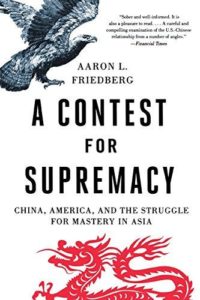What is at stake in the emerging contest between Washington and Beijing is nothing less than the future prosperity and security of free societies—in Asia and around the world, according to a prominent analyst.
What is happening inside China should shock the conscience of democratic citizens and their governments, and give pause to those who continue to believe in the transformative effects of engagement, says Aaron Friedberg, Professor of Politics and International Affairs at Princeton University.
 Just as American policymakers set out to “make the world safe for democracy” at the start of the 20th century, so Chinese leaders are using every means at their disposal to make it safe for authoritarianism, or at least for continued CCP rule, at the start of the 21st, he writes for The American Interest:
Just as American policymakers set out to “make the world safe for democracy” at the start of the 20th century, so Chinese leaders are using every means at their disposal to make it safe for authoritarianism, or at least for continued CCP rule, at the start of the 21st, he writes for The American Interest:
It is sometimes said that Beijing has no interest in spreading its own system of government or engaging in ideological rivalry with the United States and its democratic allies. Even if once true, this is not still the case….. China’s rulers no longer see themselves as operating entirely on the defensive in the ongoing clash of ideas with the West. They now feel emboldened not only to attack the inequities and inefficiencies of liberal democracy, but to advance their own distinctive mix of market-driven economics and authoritarian politics as, in Xi Jinping’s words, a “new option for other countries.”
China’s private sector is also under siege, adds Catherine Tai, the Program Officer for Asia at the Center for International Private Enterprise.
In Foreign Affairs, Ian Johnson explains How the State Is Co-Opting Religion in China.
 Over the past four decades, China has overcome significant political and economic challenges through reform and opening, but it can no longer rely on existing methods of development and reform, argues William Overholt (above), Senior Fellow at Harvard University’s Asia Center. Instead, he says China must undertake a re-invention of its politics and economics to solve pressing challenges like inequality, corruption, environmental degradation, and globalization, notes CSIS. In his new book China’s Crisis of Success, Dr. Overholt argues that Xi Jinping’s political strategy is the riskiest of any contemporary national leader, and that this strategy could result in growth, stagnation, or a serious crisis.
Over the past four decades, China has overcome significant political and economic challenges through reform and opening, but it can no longer rely on existing methods of development and reform, argues William Overholt (above), Senior Fellow at Harvard University’s Asia Center. Instead, he says China must undertake a re-invention of its politics and economics to solve pressing challenges like inequality, corruption, environmental degradation, and globalization, notes CSIS. In his new book China’s Crisis of Success, Dr. Overholt argues that Xi Jinping’s political strategy is the riskiest of any contemporary national leader, and that this strategy could result in growth, stagnation, or a serious crisis.
China’s Crisis of Success: Tuesday, January 15, 2019 2:00 pm – 3:15 pm. CSIS Headquarters. REGISTRATION
Downplaying the differences between liberal democracies and authoritarian regimes risks overlooking the vulnerability and potential frailty of CCP-ruled China while underestimating the dynamism and resilience of the United States and its allies, adds Friedberg, the author of A Contest for Supremacy: China, America and the Struggle for Mastery in Asia (Norton 2011) and, most recently, “Competing With China” (Survival, June-July 2018). Sun Tzu’s ancient aphorism is still apt: To achieve strategic success it is necessary to know the enemy, but also to know yourself. RTWT







